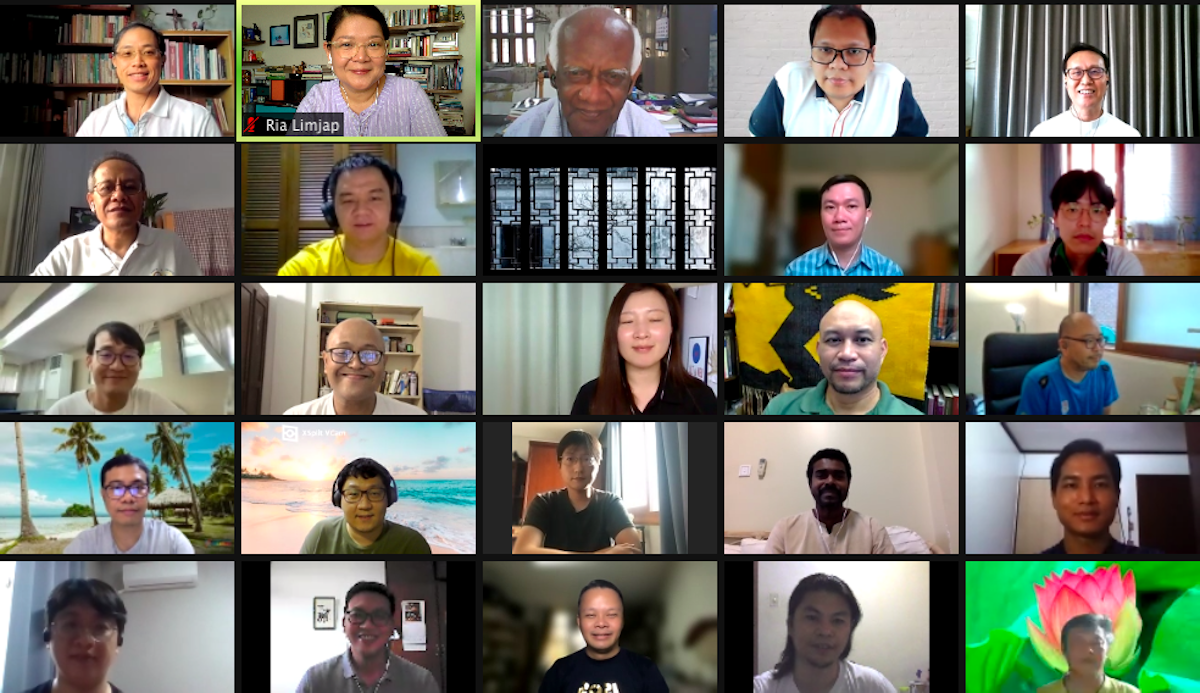 The long-awaited gathering of the East Asian Theological Encounter Programme (EATEP) happened in early July. Due to the pandemic, this year’s session was held online–a first for the group.
The long-awaited gathering of the East Asian Theological Encounter Programme (EATEP) happened in early July. Due to the pandemic, this year’s session was held online–a first for the group.
There were 21 participants composed mostly of scholastics, a few Jesuit priests, and also for the first time, two female lay collaborators. The sessions combined lectures on Asian contextual theology and Buddhist meditation practice. Fr Michael Amaladoss SJ, a widely respected theologian, gave lectures on the “Theology of Mission as the Dialogue of the Gospel with the Religions, the Cultures, and Poor of Asia” and “The Uniqueness of Christ as the Saviour and the Asian Jesus”.
Fr Amal, as many in the group fondly call him, is 84 and has retired as their mentor. Fr Manoling Francisco SJ, a Filipino Jesuit, is the new mentor for the programme and delivered a lecture on “The Roman Catholic Church on the salvation of non-Christians Post-Vatican II”.
An integral part of the Jesuit Conference’s thrust for deepening interreligious dialogue with our Buddhist brothers and sisters, EATEP consists of an intensive course at the Loyola School of Theology in Manila, and since 2010, an annual on-location workshop with lectures and other enriching activities for the participants.
Fr In-gun Kang SJ, programme director and JCAP coordinator for the Buddhist Studies and Dialogue Group, spoke about EATEP’s goal to create an environment for Jesuit scholastics to get together, live, and do theology; also to have a space for learning about Asian contextual theology, grounded in Asian realities and which considers the Buddhist context.
Cambodia-based Fr Kang, who was named by Pope Francis as a consultor of the Pontifical Council for Interreligious Dialogue in October 2020, has spent many years in the field and has a close relationship with the Buddhist monks in the country. In his opening talk, Fr Kang recalled Fr General Peter Hans Kolvenbach’s question: “Are you merely Jesuits in Asia, or genuinely Asian Jesuits?” He also remembered the words of Fr General Adolfo Nicolás, who called for the Society to be “open to Asian theological issues in the Buddhist context of Asia”. There is a need for theological training in the Asian context and the work of the Jesuits involved with EATEP and the Buddhist Studies and Dialogue Group strives to answer that call.
The online version of the programme was designed so that participants listened to lectures in the morning, and had an opportunity to ask questions. Afternoons were spent in conversation and sharing. Despite the limitations of the virtual meeting, the sessions were filled with the spirit of friendship and dialogue. Fr Amaladoss, in this last series of lectures as EATEP mentor, was patient and generous in imparting his knowledge and wisdom. He is indeed continuing to energise the young theologians of Asia. Many of the scholastics had excellent questions and thoughts of their own to share and it was a wonderful thing to have such a rich and lively interaction between senior Jesuits with much experience and younger ones in formation, eager to listen and learn.
After five days of lectures, questions, and discussions the group gathered on a Saturday morning to experience Zen meditation with Fr Mathew Cyril SJ, an Indian Jesuit and Zen master based in Bodhi Zendo, a Zen training centre in South India. From the distant Perumal Hills, Fr Cyril guided the participants over Zoom, starting off with a five-minute sitting practice and then by the end of the session, a twenty-minute meditation. All the participants were calm and peaceful afterwards, despite the intense mental gymnastics earlier in the week. At the end of the programme, there was much gratitude expressed and a spirit of friendship, which as Fr Kang put it, is the best foundation for dialogue.

